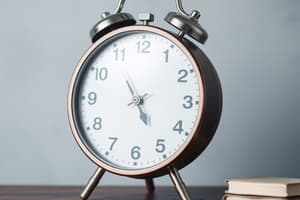Podcast
Questions and Answers
What does self-efficacy refer to?
What does self-efficacy refer to?
One's belief in one's ability to succeed in specific situations or accomplish a task.
Which of the following is a way to strengthen self-efficacy according to Bandura? (Select all that apply)
Which of the following is a way to strengthen self-efficacy according to Bandura? (Select all that apply)
- Limitations in experiences
- Emotional and physiological states (correct)
- Verbal persuasion (correct)
- Vicarious experiences (correct)
Believing in oneself is crucial to achieving success.
Believing in oneself is crucial to achieving success.
True (A)
What effect do mastery experiences have on self-efficacy?
What effect do mastery experiences have on self-efficacy?
What motivates people according to the verbal persuasion aspect of self-efficacy?
What motivates people according to the verbal persuasion aspect of self-efficacy?
How do vicarious experiences influence self-efficacy?
How do vicarious experiences influence self-efficacy?
Flashcards are hidden until you start studying
Study Notes
Self-Efficacy
- Self-efficacy is the belief in one's ability to succeed in specific situations or accomplish a task.
- Self-efficacy is a significant factor in how individuals approach goals, tasks, and challenges.
- Self-efficacy is rooted in the belief that a person has in themselves.
Increasing Self-Efficacy
- Mastery Experiences: Direct experiences of success strengthen self-efficacy. The higher the frequency of success, the stronger the belief in personal efficacy.
- Vicarious Experiences: Observing others, especially role models, succeed through hard work increases self-efficacy. Individuals choose their own role models.
- Verbal Persuasion: Motivation from influential individuals, such as parents, teachers, friends, and superiors, can increase self-efficacy. Positive statements like "you can do it" or "You're the best!" can provide significant motivation.
- Emotional and Physiological States: A person's emotional and physical state can affect self-efficacy. For example, individuals experiencing depression or stress are likely to have lower self-efficacy compared to those who are inspired and motivated.
Studying That Suits You
Use AI to generate personalized quizzes and flashcards to suit your learning preferences.




